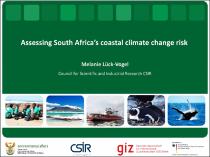JavaScript is disabled for your browser. Some features of this site may not work without it.
- ResearchSpace
- →
- Research Publications/Outputs
- →
- Conference Publications
- →
- View Item
| dc.contributor.author |
Lück-Vogel, Melanie

|
|
| dc.date.accessioned | 2020-07-13T11:43:27Z | |
| dc.date.available | 2020-07-13T11:43:27Z | |
| dc.date.issued | 2019-10 | |
| dc.identifier.citation | Lück-Vogel, M. 2019. Assessing South Africa’s coastal climate change risk. African Climate Risk Conference, Addis Ababa, Ethiopia, 7-9 October 2019, 14pp | en_US |
| dc.identifier.uri | https://www.africanclimaterisksconference2019.org/ | |
| dc.identifier.uri | https://www.africanclimaterisksconference2019.org/wp-content/uploads/2019/10/CONFERENCE-PROCEEDINGS.pdf | |
| dc.identifier.uri | http://hdl.handle.net/10204/11476 | |
| dc.description | Copyright: 2019 The African Climate Risks Conference (ACRC) Secretariat. This is the full text version of the work. | en_US |
| dc.description.abstract | In South Africa, about 40% of the people are living within 60km of the Oceans' coasts, and approximately 60% of the South African economy depends on coastal natural resources and trade infrastructure such as ports. These figures highlight the enormous importance of coastal environments and resources but also indicate the risk and vulnerability of coastal populations and assets in South Africa. To create a baseline of areas, settlements, people and assets at risk, the South African National Department for Environment, Fisheries and Forestry (DEFF), together with the German Gesellschaft für Internationale Zusammenarbeit GmbH (GIZ) launched the Coastal Climate Change Vulnerability Assessment. This project assesses the risk of South Africa's coasts to storm and sea level rise related flooding and erosion, considering future climate scenarios. Under South Africa's National Climate Change Adaptation Strategy, and building on the National Coastal Assessment, this work will integrate high resolution remote sensing, multi-criteria GIS analysis, hydrodynamic modelling and expert knowledge based models to create spatially continuous hazard risk maps for the entire South African open coast and estuaries. An effective Decision Support Tool and training material will be created in collaboration with coastal managers and climate change adaptation responsibles at all government spheres. | en_US |
| dc.language.iso | en | en_US |
| dc.publisher | The African Climate Risks Conference (ACRC) Secretariat | en_US |
| dc.relation.ispartofseries | Worklist;23423 | |
| dc.subject | Climate change | en_US |
| dc.subject | Coastal vulnerability | en_US |
| dc.subject | Global warming | en_US |
| dc.title | Assessing South Africa’s coastal climate change risk | en_US |
| dc.type | Conference Presentation | en_US |
| dc.identifier.apacitation | Lück-Vogel, M. (2019). Assessing South Africa’s coastal climate change risk. The African Climate Risks Conference (ACRC) Secretariat. http://hdl.handle.net/10204/11476 | en_ZA |
| dc.identifier.chicagocitation | Lück-Vogel, Melanie. "Assessing South Africa’s coastal climate change risk." (2019): http://hdl.handle.net/10204/11476 | en_ZA |
| dc.identifier.vancouvercitation | Lück-Vogel M, Assessing South Africa’s coastal climate change risk; The African Climate Risks Conference (ACRC) Secretariat; 2019. http://hdl.handle.net/10204/11476 . | en_ZA |
| dc.identifier.ris | TY - Conference Presentation AU - Lück-Vogel, Melanie AB - In South Africa, about 40% of the people are living within 60km of the Oceans' coasts, and approximately 60% of the South African economy depends on coastal natural resources and trade infrastructure such as ports. These figures highlight the enormous importance of coastal environments and resources but also indicate the risk and vulnerability of coastal populations and assets in South Africa. To create a baseline of areas, settlements, people and assets at risk, the South African National Department for Environment, Fisheries and Forestry (DEFF), together with the German Gesellschaft für Internationale Zusammenarbeit GmbH (GIZ) launched the Coastal Climate Change Vulnerability Assessment. This project assesses the risk of South Africa's coasts to storm and sea level rise related flooding and erosion, considering future climate scenarios. Under South Africa's National Climate Change Adaptation Strategy, and building on the National Coastal Assessment, this work will integrate high resolution remote sensing, multi-criteria GIS analysis, hydrodynamic modelling and expert knowledge based models to create spatially continuous hazard risk maps for the entire South African open coast and estuaries. An effective Decision Support Tool and training material will be created in collaboration with coastal managers and climate change adaptation responsibles at all government spheres. DA - 2019-10 DB - ResearchSpace DP - CSIR KW - Climate change KW - Coastal vulnerability KW - Global warming LK - https://researchspace.csir.co.za PY - 2019 T1 - Assessing South Africa’s coastal climate change risk TI - Assessing South Africa’s coastal climate change risk UR - http://hdl.handle.net/10204/11476 ER - | en_ZA |






